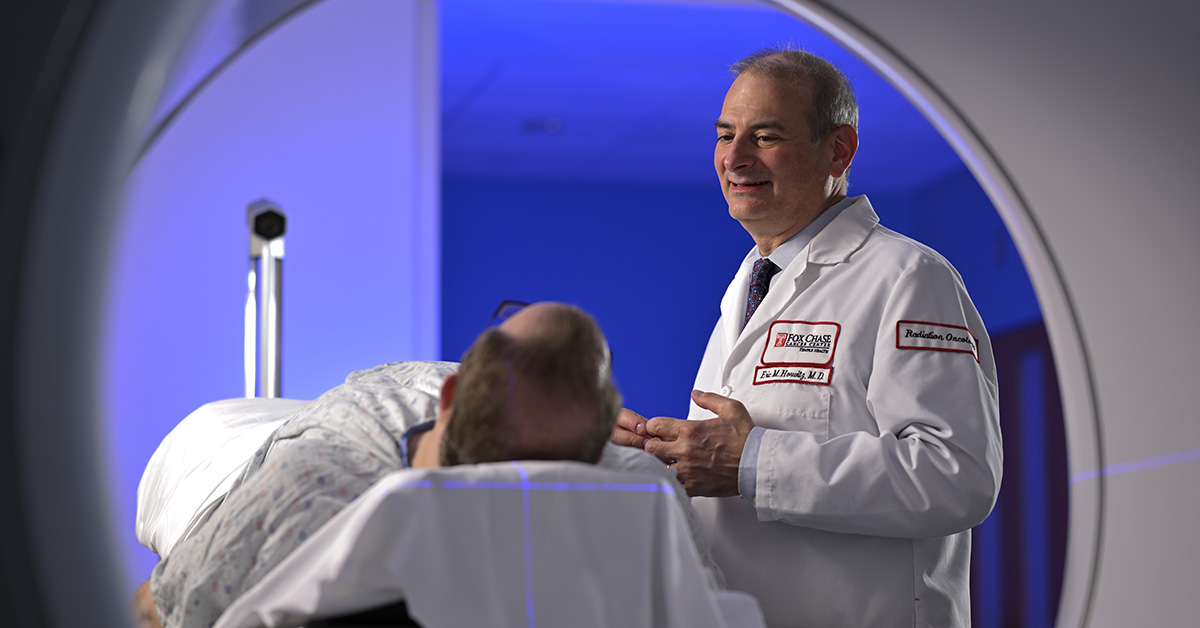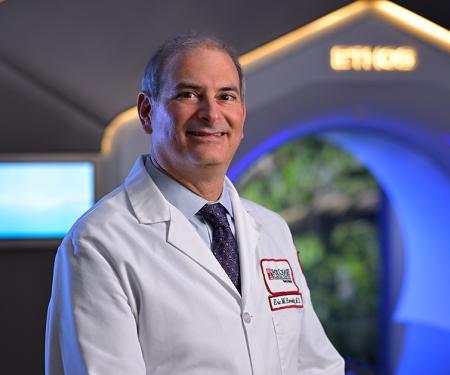
Adaptive Radiation Therapy is a revolutionary, FDA-approved approach to treatment that allows for real-time adjustments of the radiation plan to account for the cancer’s changing responses to radiation therapy such as the size and position of the tumor, and the location of nearby organs, during every radiation treatment. Fox Chase Cancer Center is one of the most experienced Cancer Centers in the Nation to use CT-based adaptive radiation therapy, both on and off clinical trials. We remain committed to developing even more sophisticated radiation treatments that are better customized to each individual patient.
With other radiation therapy techniques such as Intensity Modulated Radiation Therapy (IMRT) or Stereotactic Body Radiation Therapy (SBRT), the radiation oncology team creates a treatment plan before the start of therapy. They then use this “blueprint” plan throughout the entire course of treatment. Adaptive Radiation Therapy, however, is different.
The Radiation Oncology team at Fox Chase is using Cone-Beam Computed Tomography (CBCT)-based adaptive radiation therapy to gain more control over where the radiation dose is delivered, as they can now adjust their treatment plan to accommodate anatomical changes to the tumor and surrounding organs or tissue during every treatment. These changes in radiation can be small or large, but it allows the radiation oncologist to administer the most accurate, focused radiation dosage possible directly to the cancer. This also reduces radiation exposure for normal, healthy tissue and helps minimize side effects.
How does Adaptive Radiation Therapy work?
Specialists at Fox Chase Cancer Center provide Adaptive Radiation Therapy using EthosTM, an advanced linear accelerator (linac). EthosTM integrates a treatment accelerator, built-in cone beam CT imaging, and specialized artificial intelligence-enhanced software for image acquisition and treatment planning. Moreover, the EthosTM system includes the HyperSightTM imaging platform, ensuring highly accurate CT imaging and identification capabilities. These combined innovations enable precise surface tracking of tumors during treatment, enhancing the accuracy of adaptive treatment, particularly for tumors that undergo significant movement, such as lung cancers, breast cancers, and pancreas/liver cancers.
The revolutionary EthosTM adaptive radiotherapy system, a cutting-edge treatment planning solution, operates in real time. Leveraging state-of-the-art high-powered computing and rapid CT scanner imaging integrated directly into the linac, the system continuously rescans and recalculates the treatment plan as the patient lies on the treatment table. In mere minutes, the EthosTM linac generates advanced treatment plans, providing Fox Chase’s experienced radiation oncologists with a dynamic, 'living picture' of the tumor and the surrounding tissues. This instantaneous insight allows precise identification of the tumor's location, size, and its proximity to surrounding structures down to the millimeter. With this information, the radiation treatment plan is properly adjusted to accommodate for any changes, such as patient weight loss or shifts in organ position. This daily review process ensures a new, optimized, real-time treatment plan, delivering the ideal radiation dose to target cancer cells while minimizing the impact on healthy tissue and organs during each treatment session.
Who is a candidate for Adaptive Radiation Therapy?
Most patients who qualify for SbRT, and even some specific IMRT procedures can consider Adaptive Radiation Therapy as their standard treatment plan. In some cases, patients may even benefit from this advanced technology by participating in clinical trials. Currently, clinical trials are underway for prostate cancer, cervix cancer, and oligometastatic disease targeting specific lymph nodes. Stay tuned for upcoming trials catering to rectal cancer, bladder cancer, lung cancer, and breast cancer, all utilizing Adaptive Radiation Therapy.
“Part of our mission as a nationally designated cancer center is to utilize sophisticated technology to get better control of someone’s cancer, while at the same time inflicting the fewest possible side effects on that person. Introducing Adaptive Radiation Therapy at Fox Chase allows us to bring unique state-of-the-art cancer treatment to many patients, one not offered anywhere else in the region,” says Eric Horwitz, MD, FABS, FASTRO, chair of the Department of Radiation Oncology at Fox Chase and the Lewis Katz School of Medicine at Temple University.

